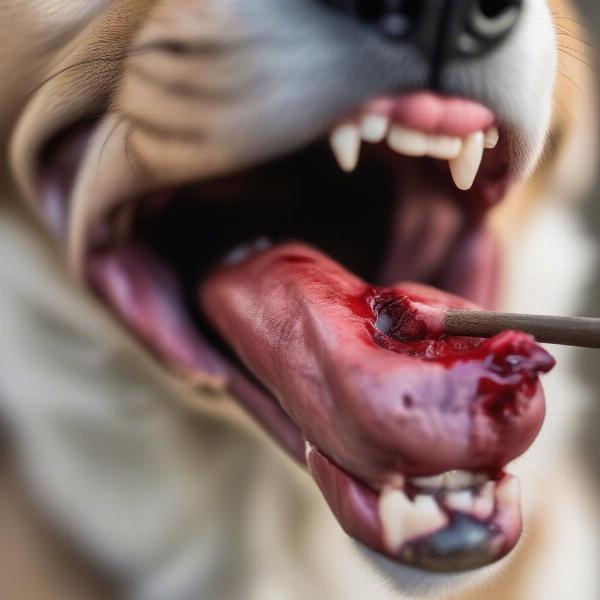Bleeding gums in dogs can be a worrying sign and may indicate an underlying health issue. While some causes are relatively minor, others can be more serious, requiring immediate veterinary attention. This article will explore the various reasons why your dog might have bleeding gums, discuss potential treatments, and provide tips for prevention.
Understanding the Causes of Bleeding Gums in Dogs
There are several reasons why your dog’s gums might be bleeding, ranging from simple gum inflammation to more serious conditions. Some common causes include periodontal disease, trauma, infections, blood clotting disorders, and even certain types of cancer. Identifying the underlying cause is crucial for effective treatment.
Periodontal Disease: The Most Common Culprit
Periodontal disease, also known as gum disease, is the most frequent cause of bleeding gums in dogs. It results from plaque and tartar buildup, leading to inflammation, infection, and eventually, gum recession and tooth loss. Regular dental care is essential in preventing and managing periodontal disease.
Trauma to the Mouth
Injuries to the mouth, such as biting on a hard object or getting hit by a flying toy, can cause bleeding gums.  Dog with a mouth injury resulting in bleeding gums These injuries may be accompanied by other signs, such as swelling, pain, and difficulty eating.
Dog with a mouth injury resulting in bleeding gums These injuries may be accompanied by other signs, such as swelling, pain, and difficulty eating.
Infections and Blood Clotting Disorders
Infections in the mouth, such as gingivitis, can cause gum inflammation and bleeding. Similarly, blood clotting disorders can make dogs more prone to bleeding gums, even from minor trauma. These conditions require veterinary diagnosis and treatment.
Cancer and Other Systemic Diseases
In some cases, bleeding gums can be a symptom of a more serious underlying illness, such as oral cancer or a systemic disease affecting blood clotting. While less common, these possibilities warrant prompt veterinary attention.
Treating Bleeding Gums in Dogs
The treatment for bleeding gums depends entirely on the underlying cause. For periodontal disease, a professional dental cleaning under anesthesia is often necessary to remove plaque and tartar buildup. dog gums bleeding Your veterinarian may also prescribe antibiotics to combat infection and pain medication to manage discomfort. For trauma, treatment may involve cleaning the wound, removing any foreign objects, and possibly suturing the gums if the injury is severe. magic mouthwash for dogs Underlying medical conditions, such as blood clotting disorders, will require specific treatment tailored to the individual dog’s needs.
Preventing Bleeding Gums in Dogs
Preventing bleeding gums is largely about maintaining good oral hygiene for your dog. Regular brushing with a dog-specific toothpaste is crucial. Providing chew toys designed to promote dental health can also help remove plaque and tartar. teething gel dogs Regular veterinary checkups, including dental examinations, are essential for early detection and prevention of dental problems. loxicom for dogs
What to Do if Your Dog’s Gums Are Bleeding
If you notice your dog’s gums are bleeding, it’s important to seek veterinary advice. While some causes are minor, others can be serious. Your veterinarian can diagnose the underlying cause and recommend appropriate treatment. bloody gums dog Early intervention can help prevent the progression of dental disease and other potential health problems.
Conclusion
Bleeding gums in dogs can be a sign of various underlying conditions, ranging from minor gum inflammation to more serious illnesses. Regular dental care, veterinary checkups, and prompt attention to any signs of bleeding gums are crucial for maintaining your dog’s oral health and overall well-being. By understanding the causes, treatments, and preventative measures, you can help keep your furry friend’s smile healthy and bright.
FAQ
- How often should I brush my dog’s teeth? Ideally, daily brushing is recommended.
- What type of toothpaste should I use for my dog? Always use toothpaste specifically formulated for dogs, as human toothpaste can be toxic to them.
- Are there any signs of periodontal disease besides bleeding gums? Yes, other signs include bad breath, loose teeth, difficulty chewing, and pawing at the mouth.
- Can diet affect my dog’s gum health? Yes, a balanced diet and dental chews can help promote good oral hygiene.
- Is anesthesia always necessary for dental cleaning? While a thorough cleaning is best performed under anesthesia, some non-anesthetic dental cleanings are available, although they may not be as effective.
- Can bleeding gums be a sign of something serious? Yes, while often minor, bleeding gums can sometimes indicate a more serious underlying health problem, warranting veterinary attention.
- What should I do if my dog’s gums are bleeding after chewing on a toy? Check for any foreign objects lodged in the gums or signs of injury. If the bleeding is persistent or severe, contact your veterinarian.
ILM Dog is a leading international online resource dedicated to providing dog owners with reliable and practical information on all aspects of dog care, from breed selection and puppy care to senior dog health and training. We are committed to helping you provide the best possible care for your canine companion. For expert advice on dog health, nutrition, behavior, and more, visit ILM Dog. Contact us via email at [email protected] or by phone at +44 20-3965-8624 for personalized guidance.